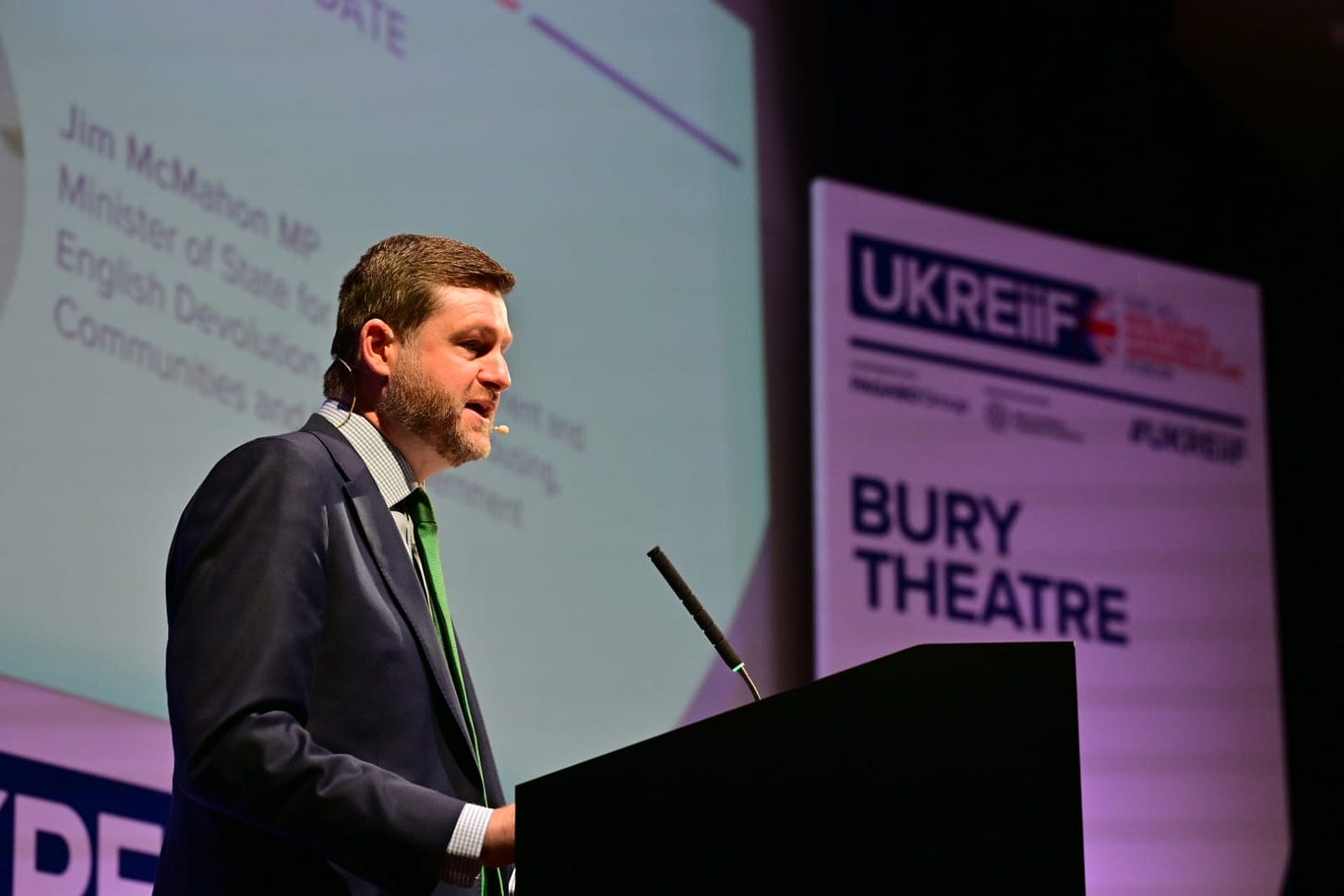UKREiiF Dispatch: progress matters more than process for devolution
The 'devolution revolution' became a ministerial buzzword at UKREiiF this week. But true progress can only be measured by impact on the ground.
Better comms for people, places and work
This is the last daily Dispatch from this year’s UKREiiF conference in Leeds.
The session was packed with insights and opportunities to connect with built environment professionals and learn from the great work that’s happening across the sector. Despite the real challenges facing the economy, the event exuded positivity and gave me confidence that we can make a positive difference as a sector.
Personal highlights included connecting with someone who went to my old school in west Wales, and Greater Manchester mayor Andy Burnham sharing our post yesterday.
Downsides: losing my accommodation due to a ‘double booking’ which left me scrambling to find somewhere else. I heard some horror stories through the week from others who’d experienced similar.
Our regular Dispatch returns on 6 June. We hope you find our newsletter useful. If you have thoughts or suggestions on what you’d like us to cover in the future, let us know in the comments or get in touch.
Why progress matters more than process for devolution
England’s ‘devolution revolution’ promises wide-ranging and lasting change to local government. But its impact on the ground will determine its success.
This was a welcome theme from the speech and discussion at UKREiiF yesterday (22 May) with the man leading the charge, local government minister Jim McMahon (pictured, below).
Mr McMahon’s address laid out a blizzard of changes and programmes designed to hand more powers to regional mayors and establish new devolved authorities in parts of England that don’t have them.
The prize on offer could be worth £55 billion in additional income every year, Mr McMahon told delegates.
This overhaul runs alongside planned local government reorganisation (or LGR in government language), which will see district and county councils replaced with unitary authorities by the end of this parliament.
“We’re empowering our local mayors to deliver a better future for our country, raising living standards, putting more money back into the pockets of working people, and putting government back in the service of local people,” said Mr McMahon.
While the reorganisations absorb time and energy, real results should be the measure of success, say those who’ve lived through devolution in other parts of the UK.
“Devolution focused on outcomes, rather than institution building, is the prize on offer,” said Scottish Labour MSP Daniel Johnson.
“That is what I think Scotland is missing out on.”
How narrratives support great places
Exeter faces devolution while getting on with providing thousands of new homes and decent jobs for a successful city.
It has an amazing story to tell, with partners who are ready to share it. Its offer includes a world-leading university, a bright and growing local population, superb spaces for businesses to grow and fabulous places to live, learn and spend time.
Stuart Brocklehurst, University of Exeter’s Deputy Vice-Chancellor for Business Engagement and Innovation, said the institution has more of the world’s top climate scientists than any of its peers. The city also leads the way in areas like diabetes research and nanotechnology.
Whatever form devolution takes in Devon, the task will be to build on the legacy of a vibrant and successful place, strongly supported by great partnership working.
“We’ve got a really great city that drives the economy,” said Exeter City Council’s Director of Place, Ian Collinson.
“We’re going to keep bringing in the homes and jobs and continue the success for the next 10 years and beyond.”
Peerless, innovative, ambitious, collaborative. For all the talk of big numbers, LGR, GVA, units and mega deals, Exeter told one of the most coherent stories I heard at UKREiiF.
It highlights that storytelling has a vital role in play in supporting successful places. As we work through the marketing material shared at the conference, we’ll come back to this topic in future posts.
Things we’ve heard
“From offshore wind and tidal to hydrogen and advanced nuclear, the region is home to some of the most exciting and scalable projects in the country. What we saw at UKREiiF was a region with the vision, capability and investment readiness to help the UK become a global clean energy superpower.”
Tom Hayes, MP for Bournemouth East and the UK’s Energy Mission Champion, speaking on the Great South West’s vision for the area including Somerset, Devon, Dorset and Cornwall.
“You can’t ‘build, build, build’ without skill, skill, skill.”
Chief executive of Harworth Group Lynda Shillaw explains how skills have overtaken planning as the top concern for industry colleagues.



